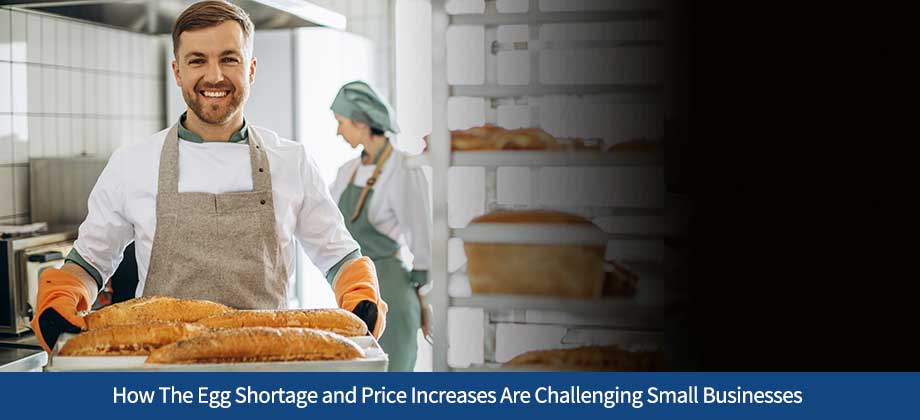How The Egg Shortage and Price Increases Are Challenging Small Businesses

Eggs are a beloved staple of countless industries, particularly for small businesses that rely on their versatility and affordability. However, with avian flu outbreaks forcing the culling of millions of chickens, the egg industry is facing an unprecedented shortage. The result? Record-high prices, surging demand, and frustration for small business owners trying to stay afloat.
For bakeries, restaurants, and even farms, these challenges have amplified existing pressures in today’s volatile economic landscape. This blog explores how egg shortages and price hikes—paired with rising costs across other key ingredients—are disrupting operations and examines creative ways small businesses are adapting.
Understanding the Cost of the Egg Shortage
The avian flu epidemic has decimated chicken populations, and as supply dwindles, the average price for a dozen Grade A eggs in U.S. cities hit $4.95 in January, doubling from $2.04 in August 2023. Compounding this problem is the USDA’s projection that prices may rise an additional 20% this year.
For small business owners, the issue is twofold:
- Price hikes force businesses to absorb costs or raise prices.
- Stock scarcity creates logistical nightmares, affecting operations and customer satisfaction.
Liz Berman, owner of The Sleepy Baker in Massachusetts, shared her frustration over unavailable bulk orders of medium-sized white eggs, forcing her to purchase more expensive, smaller supplies in individual cartons. While this may seem trivial, inefficiencies like these have a cascading effect. For sole proprietors like Liz, even small disruptions in workflow add up.
Small Businesses Bear the Brunt
The impact on bakeries goes beyond just numbers. Owners have had to make difficult decisions to maintain profitability without alienating customers.
Bakeries
Take John Nachlinger, owner of the Bad Cookie Company in New Jersey. To offset rising costs, he added a temporary 25-cent surcharge per cookie. This strategy ensures customers still receive quality products without the shock of drastic price increases. However, profit margins on baked goods remain tight, and balancing quality with affordability is a constant struggle.
Meanwhile, at Chicago’s Daisies restaurant, chefs have started adapting recipes, reducing their reliance on egg-heavy items by exploring vegan alternatives such as flax seeds for desserts. Joe Frillman, chef and partner at Daisies, even adjusted their famed pasta recipes to use extruded dough with fewer eggs.
Farms
Egg producers face challenges too—especially farms suddenly flooded with demand. Stephanie Maynard, co-owner of Ox Hollow Farm in Connecticut, described how surging supermarket outages drove customers to local greenmarkets. While demand growth is welcome, it puts pressure on farms like Ox Hollow, which are smaller-scale operations balancing seasonal cycles with spikes in orders.
Adaptations and Solutions
It’s clear the egg shortage is testing the resilience of small businesses, but many are responding creatively. Here are a few ways these businesses are thriving in the face of adversity.
1. Reimagining Products
Some businesses are reconsidering how they approach traditional recipes. For restaurants, this means experimenting with vegan options or reducing the reliance on eggs in staple menu items. Offering alternatives not only saves on costs but also taps into the growing market for plant-based diets.
2. Temporary Surcharges
Short-term solutions, like adding small surcharges to cover rising costs, ease immediate financial strain without permanently alienating customers. Transparency in communication can help customers understand why price adjustments are necessary.
3. Reducing Waste
By saving egg whites or yolks during specific recipes, restaurants like Daisies have discovered ways to minimize waste and stretch existing supplies further. This strategy also aligns with broader sustainability goals.
4. Diversified Supply Chains
Businesses like Ox Hollow Farm are reassessing supplier relationships to better respond to demand. Small businesses could benefit from diversifying supply chains, accessing local producers—who may be more stable than large-scale suppliers—and exploring ingredient substitutes where possible.
5. Financial Support
For bakeries, restaurants, and farms tightening their budgets while innovating, access to flexible financial solutions can become a lifeline. Tools like revolving lines of credit with principal pause options (allowing for lower payments during tough periods) ensure operational hurdles don’t halt long-term growth plans. The ARF Financial Bankroll with Principal Pause offers tailored funding solutions that adapt to dynamic challenges like these.
How Business Owners Can Prepare
While the egg shortage reflects broader agricultural vulnerabilities, it underscores the need for businesses to remain agile. Here are some actionable steps small business owners can take to build resilience during periods of disruption:
Leverage Community Engagement
Use this challenging period to deepen customer relationships. Transparent communication about price changes, ingredient substitutions, or menu updates fosters loyalty. Customers are often willing to support businesses they trust through tough times.
Upgrade Financial Literacy
Understanding financial tools and platforms can empower better decision-making. Revolving credit options or solutions like ARF Financial’s Bankroll provide flexibility for navigating cash flow challenges.
Analyze Costs Regularly
By monitoring expenses closely and brainstorming changes that boost efficiency, businesses can uncover simpler solutions hidden within their current operations.
Stay Updated on Alerts
Knowing when disruptions like the avian flu show early signs allows businesses to stockpile non-perishable supplies or make contingency plans in advance.
Thriving Beyond the Egg Crisis
Small businesses have always been at the forefront of resilience, creatively tackling challenges with determination and innovation. The egg shortage—and its cascading effects across industries—has highlighted both the vulnerabilities and strengths of businesses nationwide.
With flexible strategies, open communication, and the right financial tools, small business owners can adapt and even evolve their models to foster long-term sustainability.
If your business is feeling the strain from increased bakery costs, supply shortages, or other operational challenges, help is available. Learn how a revolving line of credit from ARF Financial can empower your growth today.
Your privacy is important to us. ARF Financial will never sell or rent your information to any third party. Click here for more information about our privacy policy. Image by senivpetro on Freepik

